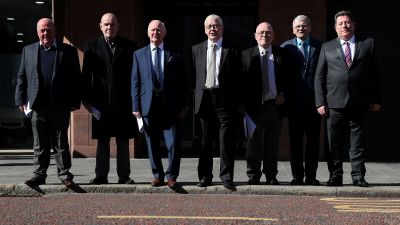Challenge to ‘Hooded Men’ investigation ruling before Supreme Court

The UK's Supreme Court is to hear the PSNI Chief Constable’s challenge to a judgment that there should be an independent investigation into the 'Hooded Men' case.
The case also involves the Secretary of State for Northern Ireland and the Department of Justice.
The 14 Catholic men were interned at an army camp in Ballykelly and subjected to interrogation techniques including hooding, being put in stress positions, being forced to listen to white noise, and being deprived of sleep, food and water.
Ahead of the hearing, Francis McGuigan, one of the Hooded Men, said: “I hope the Supreme Court will not only say there should be an investigation to identify and hold to account those who were responsible for authorising and carrying out torture on us, but also that the PSNI are not independent and must not conduct it.
“Truth and justice must prevail. This case doesn’t just matter for me as a ‘Hooded Man’, it is important for every torture victim past, present and future”.
Human rights organisation Amnesty International are intervenors in the case.
Grainne Teggart, Amnesty International’s Northern Ireland Campaign Manager, said: “All eyes should be on this challenge, which will be hugely significant to torture victims across the world and the ongoing unresolved issue of legacy of the Troubles. It should concern us all that the PSNI continue to argue against an independent, effective investigation into state-sanctioned torture.
“The implications of this case cannot be overstated. This is not just about long-overdue justice for the ‘Hooded Men’, it will also affect other victims of the Troubles who are still being denied truth and justice.”
Darragh Mackin, solicitor for Phoenix Law, said: “As the Lord Chief Justice has previously made clear, ‘there is a real danger that the rule of law is undermined if that extends to protecting Ministers from investigation in respect of criminal offences possibly committed by them’.
"For the same reasons, we intend to vigorously defend the Chief Constable’s appeal before the Supreme Court.”